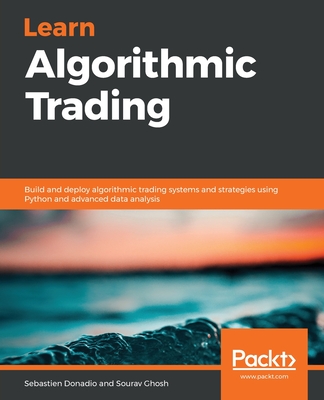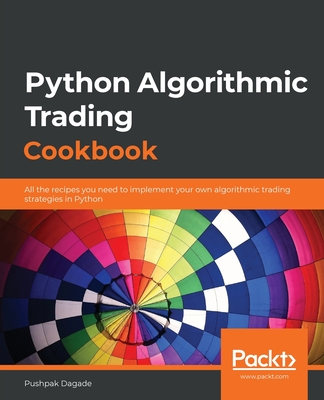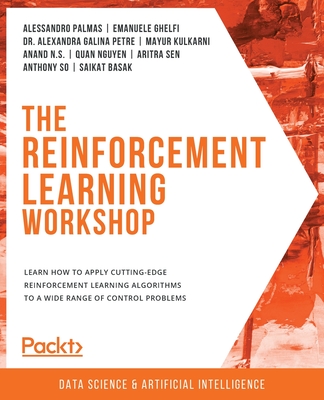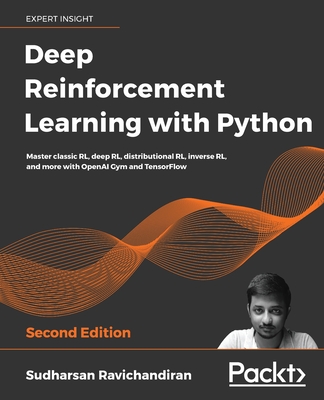Reinforcement Learning for Finance: Solve Problems in Finance with CNN and Rnn Using the Tensorflow Library
暫譯: 金融強化學習:使用 TensorFlow 函式庫的 CNN 和 RNN 解決金融問題
Ahlawat, Samit
- 出版商: Apress
- 出版日期: 2022-12-27
- 售價: $1,310
- 貴賓價: 9.5 折 $1,245
- 語言: 英文
- 頁數: 134
- 裝訂: Quality Paper - also called trade paper
- ISBN: 1484288343
- ISBN-13: 9781484288344
-
相關分類:
Reinforcement、TensorFlow、Python
立即出貨 (庫存=1)
買這商品的人也買了...
-
 Python and HDF5 (Paperback)
Python and HDF5 (Paperback)$969$918 -
 $1,710Learn Algorithmic Trading
$1,710Learn Algorithmic Trading -
 $454InfluxDB 原理與實戰
$454InfluxDB 原理與實戰 -
 Machine Learning for Algorithmic Trading, 2/e (Paperback)
Machine Learning for Algorithmic Trading, 2/e (Paperback)$2,100$1,995 -
 Python Algorithmic Trading Cookbook: All the recipes you need to implement your own algorithmic trading strategies in Python
Python Algorithmic Trading Cookbook: All the recipes you need to implement your own algorithmic trading strategies in Python$1,700$1,615 -
 Kubeflow for Machine Learning: From Lab to Production
Kubeflow for Machine Learning: From Lab to Production$1,786$1,692 -
 $500事件流實戰
$500事件流實戰 -
 MongoDB 技術手冊, 3/e (MongoDB: The Definitive Guide: Powerful and Scalable Data Storage, 3/e)
MongoDB 技術手冊, 3/e (MongoDB: The Definitive Guide: Powerful and Scalable Data Storage, 3/e)$780$616 -
 Algorithmic Short Selling with Python: Refine your algorithmic trading edge, consistently generate investment ideas, and build a robust long/short pro (Paperback)
Algorithmic Short Selling with Python: Refine your algorithmic trading edge, consistently generate investment ideas, and build a robust long/short pro (Paperback)$2,200$2,090 -
 從 OS 等級探究:Redis 運作原理程式逐行講解
從 OS 等級探究:Redis 運作原理程式逐行講解$880$695 -
 Advanced Python Programming : Accelerate your Python programs using proven techniques and design patterns, 2/e (Paperback)
Advanced Python Programming : Accelerate your Python programs using proven techniques and design patterns, 2/e (Paperback)$1,800$1,710 -
 Time Series Analysis with Python Cookbook: Practical recipes for exploratory data analysis, data preparation, forecasting, and model evaluation (Paperback)
Time Series Analysis with Python Cookbook: Practical recipes for exploratory data analysis, data preparation, forecasting, and model evaluation (Paperback)$1,960$1,862 -
 $449跨數據中心機器學習:賦能多雲智能數算融合
$449跨數據中心機器學習:賦能多雲智能數算融合 -
 使用 GitOps 實現 Kubernetes 的持續部署:模式、流程及工具
使用 GitOps 實現 Kubernetes 的持續部署:模式、流程及工具$714$678 -
 Elasticsearch 數據搜索與分析實戰
Elasticsearch 數據搜索與分析實戰$599$569 -
 Kafka 實戰
Kafka 實戰$539$512 -
 資料視覺化|使用 Python 與 JavaScript, 2/e (Data Visualization with Python and JavaScript: Scrape, Clean, Explore, and Transform Your Data, 2/e)
資料視覺化|使用 Python 與 JavaScript, 2/e (Data Visualization with Python and JavaScript: Scrape, Clean, Explore, and Transform Your Data, 2/e)$880$695 -
 Practical Machine Learning on Databricks: Seamlessly transition ML models and MLOps on Databricks (Paperback)
Practical Machine Learning on Databricks: Seamlessly transition ML models and MLOps on Databricks (Paperback)$1,750$1,663 -
 $449基於 GPT-3、ChatGPT、GPT-4 等 Transformer 架構的自然語言處理
$449基於 GPT-3、ChatGPT、GPT-4 等 Transformer 架構的自然語言處理 -
 最強 AI 組合技!NotebookLM / Gemini / Nano Banana / Veo 3 【影音生成進化版】
最強 AI 組合技!NotebookLM / Gemini / Nano Banana / Veo 3 【影音生成進化版】$499$394 -
 Nano Banana 藝術宇宙 - Veo x Sora: 多模態 AI 創作時代
Nano Banana 藝術宇宙 - Veo x Sora: 多模態 AI 創作時代$650$514
商品描述
This book introduces reinforcement learning with mathematical theory and practical examples from quantitative finance using the TensorFlow library.
Reinforcement Learning for Finance begins by describing methods for training neural networks. Next, it discusses CNN and RNN - two kinds of neural networks used as deep learning networks in reinforcement learning. Further, the book dives into reinforcement learning theory, explaining the Markov decision process, value function, policy, and policy gradients, with their mathematical formulations and learning algorithms. It covers recent reinforcement learning algorithms from double deep-Q networks to twin-delayed deep deterministic policy gradients and generative adversarial networks with examples using the TensorFlow Python library. It also serves as a quick hands-on guide to TensorFlow programming, covering concepts ranging from variables and graphs to automatic differentiation, layers, models, and loss functions.
After completing this book, you will understand reinforcement learning with deep q and generative adversarial networks using the TensorFlow library.
What You Will Learn
Who This Book Is ForData Scientists, Machine Learning engineers and Python programmers who want to apply reinforcement learning to solve problems.
Reinforcement Learning for Finance begins by describing methods for training neural networks. Next, it discusses CNN and RNN - two kinds of neural networks used as deep learning networks in reinforcement learning. Further, the book dives into reinforcement learning theory, explaining the Markov decision process, value function, policy, and policy gradients, with their mathematical formulations and learning algorithms. It covers recent reinforcement learning algorithms from double deep-Q networks to twin-delayed deep deterministic policy gradients and generative adversarial networks with examples using the TensorFlow Python library. It also serves as a quick hands-on guide to TensorFlow programming, covering concepts ranging from variables and graphs to automatic differentiation, layers, models, and loss functions.
After completing this book, you will understand reinforcement learning with deep q and generative adversarial networks using the TensorFlow library.
What You Will Learn
- Understand the fundamentals of reinforcement learning
- Apply reinforcement learning programming techniques to solve quantitative-finance problems
- Gain insight into convolutional neural networks and recurrent neural networks
- Understand the Markov decision process
Who This Book Is ForData Scientists, Machine Learning engineers and Python programmers who want to apply reinforcement learning to solve problems.
商品描述(中文翻譯)
本書介紹了強化學習的數學理論及其在量化金融中的實際範例,並使用 TensorFlow 函式庫進行實作。《強化學習與金融》首先描述了訓練神經網絡的方法。接著,討論了 CNN 和 RNN 這兩種作為深度學習網絡的神經網絡,並應用於強化學習中。進一步地,本書深入探討強化學習理論,解釋馬可夫決策過程、價值函數、策略及策略梯度,並提供其數學公式及學習算法。它涵蓋了從雙深度 Q 網絡到雙延遲深度確定性策略梯度及生成對抗網絡的最新強化學習算法,並使用 TensorFlow Python 函式庫提供範例。此外,本書還作為 TensorFlow 程式設計的快速實作指南,涵蓋從變數和圖形到自動微分、層、模型和損失函數等概念。
完成本書後,您將能夠理解使用 TensorFlow 函式庫的深度 Q 和生成對抗網絡的強化學習。
您將學到什麼
- 理解強化學習的基本原理
- 應用強化學習程式設計技術解決量化金融問題
- 深入了解卷積神經網絡和遞迴神經網絡
- 理解馬可夫決策過程
本書適合誰閱讀
數據科學家、機器學習工程師及希望應用強化學習解決問題的 Python 程式設計師。
作者簡介
Samit Ahlawat is a Senior Vice President in Quantitative Research, Capital Modeling at J.P. Morgan Chase in New York, US. In his current role, he is responsible for building trading strategies for asset management and for building risk management models. His research interests include artificial intelligence, risk management and algorithmic trading strategies. He has given CQF institute talks on artificial intelligence, has authored several research papers in finance and holds a patent for facial recognition technology. In his spare time, he contributes to open source code.
作者簡介(中文翻譯)
Samit Ahlawat 是美國紐約摩根大通(J.P. Morgan Chase)量化研究部資本建模的高級副總裁。在他目前的職位中,他負責為資產管理建立交易策略以及建立風險管理模型。他的研究興趣包括人工智慧、風險管理和算法交易策略。他曾在 CQF 學院發表有關人工智慧的演講,並撰寫了幾篇金融研究論文,還擁有一項面部識別技術的專利。在空閒時間,他貢獻於開源代碼。










